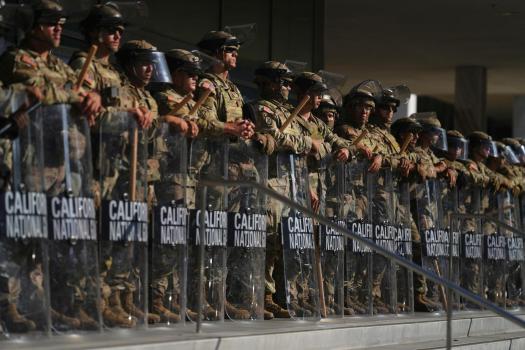By RODRIGUEZ, OLGA R.
AP’s San Francisco Whether the Trump administration broke federal law by ordering National Guard members to go with immigration officers on raids in Southern California is being considered by a federal judge in San Francisco.
Related Articles
-
Failed New Mexico candidate gets 80 years for convictions in shootings at officials homes
-
9 people plead not guilty in a Texas elections probe involving vote harvesting
-
CDC shooting marks latest in a string of hostility directed at health workers. Many aren t surprised
-
Mexico says 26 capos sent to US were requested by Trump administration, not part of tariff talks
-
Jury finds Texas couple guilty of concealing and harboring bakery workers in the US illegally
Wednesday marked the end of a three-day trial in the case.
According to California, the troops broke the Posses Comitatus Act, which forbids the use of force to enforce domestic laws. The law doesn’t apply, according to the administration’s attorneys, because President Donald Trump summoned the National Guard under a power that permits their deployment in the event that the president is unable to enforce US laws with the regular military.
The trial’s third day was mostly devoted to vexatious debates concerning the 1878 statute and whether the court even had a role in defining the boundaries of presidential power, while federal and military officials were called to testify.
Following protests in response to immigration raids throughout the city, Trump sent 700 Marines and 4,000 members of the National Guard to Los Angeles in June. Initially, they were used to guard government property, such as a detention facility that demonstrators were targeting. Later, the Guard members started protecting agents as they detained anyone they believed to be in the country illegally. Through November, between 250 and 300 Guard men are still in service.
“The Posse Comitatus Act does not apply because the Guard was deployed under a section of the U.S. Code that allows the president to call any state’s guard into federal service when the country is invaded, when there is a rebellion or danger of a rebellion against the authority of the Government, or when the president is unable to execute the laws of the United States,” said Deputy Assistant Attorney General Eric Hamilton on Wednesday.
He said that Guard members were merely acting as backup protection for federal authorities and were not actively involved in law enforcement.
According to him, it isn’t law enforcement at all if the goal is to protect law enforcement personnel. Additionally, there is the inherent protecting power of the president as stipulated in the constitution. That is a Posse Comitatus Act exception in and of itself.
Meghan Strong, the deputy attorney general for California, contended that the troops’ duties extended beyond guarding federal buildings and agents. She claimed that by establishing perimeters and checkpoints that prevented access to public streets and by detaining individuals at least twice, the army played an active, direct role in upholding the law.
Despite all of the artifice and wordplay the defendants have attempted, the facts cannot be avoided: She claimed that the Posse Comitatus Act is violated by the actions defendants have directed Task Force 51 personnel to take throughout Southern California. The command post that was formed to coordinate the deployment of troops was called Task Force 51.
She claimed that by deploying the army to unlawfully enforce civilian law and work as a single team with federal immigration officers—who frequently dress in military attire—the Trump administration had broken the law.
California is requesting that Judge Charles Breyer order the Trump administration to give the state back control of the remaining troops and to prevent any federal agent or officer from using military forces in California to carry out or aid in the execution of federal law or any civilian law enforcement duties.
According to David Levine, a professor at UC College of the Law San Francisco, the question in this case is whether or not the military stationed in Los Angeles have exceeded that threshold. Are they posing as police or members of the military? They are not police officers. They are limited in what they can do.
Hamilton told the judge that troops stationed in Southern California received at least 60 requests for help from federal officials and addressed most of them.
According to Army Maj. Gen. Scott Sherman, who oversaw Task Force 51, there were instances in which the number of troops exceeded that of federal officers. According to him, there were perhaps 300 task force troops and 200 federal law enforcement officers present during an immigration enforcement operation at an illicit marijuana growing operation in Mecca, a desert village located about 140 miles east of Los Angeles.
As a show of force against those who are in the country illegally and those who are opposing the Trump administration’s immigration crackdown, National Guard troops also joined federal immigration officers on raids at two state-licensed marijuana nurseries in Ventura County and at an operation at MacArthur Park in downtown Los Angeles.
On the second day of the trial, Sherman testified that he expressed worries that the deployment would be in violation of the Posse Comitatus Act.
According to him, soldiers received legal training and were provided with materials that listed the precise actions that were forbidden under the legislation, such as conducting security patrols and managing traffic, crowds, and riots.
Although the Posse Comitatus Act forbids troops from engaging in such acts, Sherman claimed that his commanders informed him that there was a constitutional exception that allowed such actions when the forces were defending government individuals or property.








